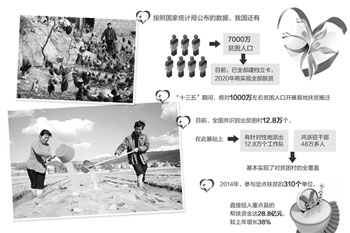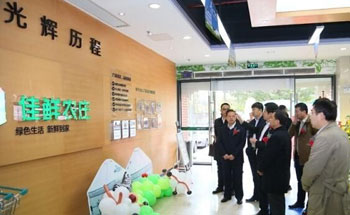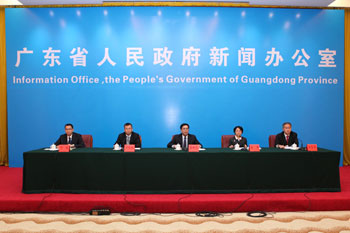How to help 70 million people get rid of poverty in 5 years
Original title: work hard and get rid of poverty by 70 million in 5 years

Above, Baokang County, Hubei Province, vigorously develops the local chicken breeding industry under the forest, increasing the annual income of local farmers by more than 3400 million yuan. Below, Weishan County, Dali, Yunnan Province, through policy support, material subsidies, technical guidance and other means, guide farmers to develop vegetables, red snow pears and other plateau characteristic industries Zhang Shulu
The trumpet of the battle against poverty has been sounded! The Central work Conference on Poverty Alleviation and Development held not long ago proposed that it is necessary to set Yugong's ambition to move away from the mountain, set goals, work hard, and resolutely win the battle against poverty, so as to ensure that by 2020 all poor areas and poor people will enter a well-off society in an all-round way. So, in the next five years, how to get rid of poverty accurately?
Help who--
Accurate identification and filing card
"I thought I could only live in an adobe house in my life, but I didn't expect to be able to live in a red brick house and use a solar water heater." Sitting in a neat and spacious new house, Zhang Caixia looked at the photos of her ramshackle old adobe dilapidated house.
Zhang Caixia is a native of Camel Xiang Village, Zhang Yi Town, Yuanzhou District, Guyuan City, Ningxia. Before the reform and opening up, Camel Lane was a famous begging village. Every year, more than 300 of the 600 or so families in the village go out to beg for food. Compared with other villagers, Zhang Caixia's family is more difficult because her husband suffers from severe stomach trouble and is unable to work, and her three children are still in school. In 2014, Zhang Caixia was identified as a particularly poor household after the preliminary evaluation of Tuoxiang Village, the review of Zhangyi Town, the examination and approval of Yuanzhou District, and after publicity and announcement, and took the lead in setting up a card. Subsequently, according to the unified standards of the autonomous region, the government helped her demolish the dilapidated house and build a new house of 54 square meters.
Thanks to the great changes in the life of Zhang Caixia and her family, China has comprehensively carried out the work of accurate identification and filing of poor people since the end of 2013.
For a long time, there have been problems in poverty alleviation and development in China, such as the number of people living in poverty is unclear, the situation is unknown, the pertinence is not strong, and the funds and projects for poverty alleviation are not directed correctly. In order to ensure the effectiveness of poverty alleviation, we must properly solve the problem of "who to help", ensure that the real poor people are clearly understood, and that the poor population, the degree of poverty, and the causes of poverty are clearly understood, so that policies can be implemented according to households and people. " Liu Yongfu, director of the State Council Poverty Alleviation Office, said.
Identifying poor households is a basic task. The screening benchmark is that the per capita annual income of families is less than 2300 yuan, which is the latest poverty line announced in China on November 29th. Since then, it has been converted to the cumulative inflation rate of 2300 yuan in 2011, which will be about 3000 yuan in the second half of last year. Ningxia subdivides the identification of the poor into ten steps: household application, group nomination, household inspection, village preliminary evaluation, township review, county examination and approval, three publicity, one announcement, system management, and dynamic tone. For example, the so-called household inspection is that after the peasant household application and the village group nomination, the village committee organizes the personnel to conduct the household survey and fill in the household questionnaire.
What is the basis of the investigation?
"look at the house, look at the grain, see whether the labor force is strong or not, and fourth, see if there is a scholar." In the poor rural areas of Ningxia, as long as the identification formula for poor households is mentioned, everyone can blurt it out. It is understood that in accordance with the requirements of the central authorities, all localities have to go through the procedure of "three trials, two publicity and one disclosure" when identifying poor households, and there are generally "four views" in specific operation.
"when you look at the house, you look at the housing situation of the common people. in fact, it depends not only on the housing, but also on the property condition of the people. Second, look at grain and look at the basic production and living conditions of the common people. If a family can't even eat, of course it's a poor family. Third, whether the labor force is strong or not mainly depends on the labor force situation of ordinary people's families, whether there are disabled people, whether there are long-term patients, and so on. Fourth, see if there is a scholar. Education is often an important burden on peasant families, and it is also the hope of getting rid of poverty in the long run. " Hong Tianyun, deputy director of the Poverty Alleviation Office of the State Council, said. According to the procedure of "three trials, two publicity and one disclosure", the total number of poor people in the country is more than 89 million.
"more than 70 million people living in poverty released by the National Bureau of Statistics are sample survey data, and more than 89 million are data from our poverty alleviation departments. According to the government work report, the number of poor people should be reduced by 10 million every year. From the level of our work, the extra 19 million poor people have to be lifted out of poverty in a real way. " Hong Tianyun said. At present, all of these 89 million poor people have set up archives and set up cards.
Who will help--
Government leads people from all walks of life to participate
The mountain is speechless, but the clouds are steaming and Xiawei. Luo Yuke, a villager of Pingsheng Village, Shiyan Township, Zheng'an County, Guizhou Province, lives in the mountains. Because of the difficult natural conditions, he can only afford enough food and clothing, but he still can't get a wife after he is old. Fortunately, with the help of the village team, Luo Yuke threw off the hat of poverty by raising native chickens and growing ecological chili peppers, built a building of more than 100 square meters and married a wife. It turns out that according to the idea of "one village, one synchronous well-off task force, one household responsible for getting rid of poverty and becoming rich," Guizhou Province has selected and dispatched 55864 village members from four government departments at the provincial, municipal, county, and township levels, and dispatched synchronous well-off working groups to all 9000 poverty-stricken villages in the province.
The party and the government have an unshirkable responsibility in accurately getting rid of poverty. The Central work Conference on Poverty Alleviation and Development held not long ago demanded that the local party committees and governments with heavy tasks of poverty alleviation should regard poverty alleviation as the top priority and the first livelihood project during the 13th five-year Plan period, persist in taking charge of the overall economic and social development by tackling poverty, sign letters of responsibility for poverty alleviation at various levels, issue military warrants, establish annual poverty alleviation reports and supervision systems, and strengthen the accountability of inspectors. Take the achievements of poverty alleviation as an important basis for selecting and appointing cadres, inspect and identify cadres on the front line of poverty alleviation, encourage cadres at all levels to give full play to their skills on the battlefield of poverty alleviation, and organically combine the consolidation of rural grass-roots party organizations with poverty alleviation, so as to select the top leaders and strengthen the leading bodies. According to Liu Yongfu, so far, a total of 128000 poverty-stricken villages have been identified nationwide. On this basis, 128000 task forces have been dispatched with more than 480000 cadres stationed, basically achieving full coverage of poverty-stricken villages. Take Pingsheng Village as an example. Among the several cadres stationed in the village, Zhang Shunlai is from the county poverty alleviation office, Yu Fang is from the township party and government office, and Zheng Zhouliang is from the township cash crop development office. They are not only familiar with the policy guidance, but also understand the market demand, and the suggestions put forward in combination with the situation of the village are of great value. For example, cadres stationed in the village suggested the development of cold vegetables and ecological agriculture, which achieved remarkable results. Last year, Luo Yuke earned 70,000 to 80,000 yuan just by raising native chickens and growing ecological chili peppers.
"Poverty alleviation through development is the responsibility of the whole party, the whole country, and the whole society, and it is necessary to extensively mobilize all sectors of society to actively participate, strive to form a strong joint force in poverty alleviation through development, and constantly improve the work pattern of poverty alleviation. It is necessary to give full play to the exemplary and leading role of designated poverty alleviation and eastern-western poverty alleviation cooperation in social poverty alleviation, extensively mobilize enterprises, social organizations, and individuals to participate in poverty alleviation, and guide the effective allocation of social resources in all sectors to poverty-stricken areas. to create a good trend of helping the poor and helping each other in the whole society. " Liu Yongfu said.
- Prev

The whole industry chain of Guangdong agricultural reclamation makes up for the deficiency of e-commerce.
The whole industry chain of Guangdong agricultural reclamation makes up for the deficiency of e-commerce.
- Next

Guangdong "Agricultural material Supervision 2.0"extraterritorial only" pesticide ban
Guangdong "Agricultural material Supervision 2.0"extraterritorial only" pesticide ban
Related
- A course of planting techniques and methods on how to grow carrots
- How to plant the latest tulips?
- Is it better to pick tea in the morning or in the afternoon? When is the best time for tea to be picked? what is the third or fifth tea?
- Launch Yuanxiao Happy combination Haocha + Tea Yuan healthy Taste
- Penghu Tourism "Fireworks 20 Parade with You"
- 2022 West Lake Happiness holds "Digital Revitalization Voucher" and draws iphone13 and laptop.
- Banqiao Fuzhou social houses are designed to change start-up combined with police elimination to create a safe and livable environment
- The convenient measure of "mechanical weeding" in Xinbei has been abused and the Agriculture Bureau has imposed heavy penalties on the illegal land consolidation.
- Changgeng University Joins Hands with Four Memory Factories to Rescue Memory Talent Shortage
- The list of Taiwan's top 100 MVP managers is listed by the Director-General of the Farmers' Association of Sanxia District.

